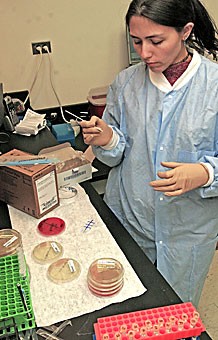Scientists at a UA lab are putting the finishing touches on a new method to detect aggressive bacteria infections 95 percent faster, which could save hospitals around the nation hundreds of thousands of dollars.
If approved by the Food and Drug Administration, a genetic screening machine that can quickly detect methicillin-resistant Staphylococcus aureus will soon be available to hospitals, health centers and athletic facilities.
“”If you can prevent cases of hospital acquisition you can save the hospital an estimated $40,000 per patient in quarantine and other expenses,”” said Donna Wolk, a member of BIO5 and assistant professor of pathology at the UA College of Medicine who specializes in rapid diagnosis research.
University Medical Center is one of eight hospitals collaborating in a nationwide project for rapid MRSA detection.
Wolk’s pathology lab specializes in adapting scientific equipment for practical use, or “”translational research,”” and serves as the reference lab for culturing, which means the seven other sites send samples to the UA lab for testing.
“”Basically, we are a bench to bedside operation, we take the basic science and apply it to the patient,”” said Wolk, who hopes to have FDA approval and market availability in six months.
There are two strains of MRSA bacteria: hospital-acquired and community-acquired, the latter being a more pathogenic, aggressive version. Both strains can cause severe infection if misdiagnosed or untreated, and because of the bacteria’s ability to spread infection rapidly, an equally efficient detection method is needed.
With both types, quarantine is necessary to prevent an outbreak, which can cost thousands of dollars in isolation, treatment and disinfectant measures, Wolk said.
Wolk’s advice to students who are worried or confused about the dangers of MRSA is to wipe down equipment before and after use at the gym and to not share towels or razors in the locker room.
“”It can be a ‘flesh-eating’ bacteria, but it’s not going to jump out and come after you,”” Wolk said. “”But if you are a gym user or a college student, this is something you should be aware of.””
The detection method being tested employs polymerase chain reaction, a process that purifies genetic material and amplifies DNA samples from the bacteria.
“”It’s basically like a big, molecular photocopy process,”” Wolk said.
The PCR method extracts a DNA strand from the sample and uses laser beams to scan it with different wavelengths to determine which antibiotics the sample is susceptible to.
Wolk said the process takes about two hours.
With the existing culture method, the bacteria sample is grown in a dish and then exposed to different antibiotics to see what kills it, therefore determining what type of MRSA, if any, is present.
On average, the current method takes 48 hours, which is simply too long because of the danger of the infection, said Lisette LeCorgne, a nurse practitioner at Campus Health Service.
“”It’s so virulent…it’s just not feasible to wait 48 hours for the culture,”” said LeCorgne.
She saidthe benefits to Campus Health would be enormous because it would eliminate possible misdiagnosis of cases.
“”Nobody waits for (the culture results), they just make an educated diagnosis,”” she added.
The $45,000 machine, called GeneXpert, is small – only a few cubic feet – and can be set up just about anywhere, which would make it an easy addition to any health care facility that deals with MRSA.
“”The machine itself is already out – we are working on the MRSA aspect,”” said Erin Picton, a microbiology senior and research technician also working on the project.
GeneXpert, manufactured by Cepheid Inc., is on the market for use in other types of high-sensitivity tests, but the BIO5 is the first to use it for MRSA detection.
The samples are inserted into cartridges, and the machine can run up to eight samples at once.
A culture sample costs $15 per test, and the new method costs $25 per test cartridge.
Despite the cost difference, the benefits of swift and proper diagnosis will outweigh the costs, said Wolk.
The pathology lab is currently testing for MRSA using swabs from the nose and facial areas.
The next phase will involve testing samples from open wounds.









